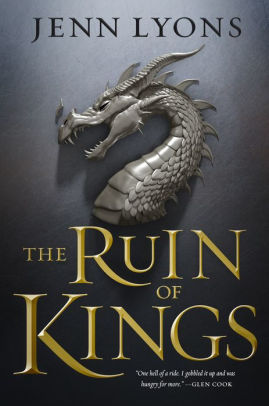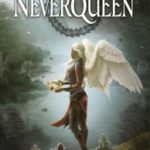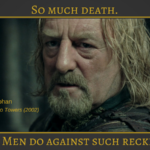A Resurgence Of Epic Fantasy?
From my perspective, epic fantasy is always alive and well, but there was a time when science fiction ruled speculative fiction. Back when brick and mortar stores were more relevant than they are now, I would go into a Borders bookstore or the like and browse, only to discover that “fantasy’ as a section within fiction didn’t exist. Well, it did, but all those books were shelved in the section labeled Science Fiction, and unless I’d asked, I would have passed them by.
Then along came Harry Potter. And The Lord Of The Rings movies. Suddenly epic fantasy was relevant again, though it soon turned darker in the form of horror or urban fantasy or dystopian. Thankfully a number of Christian writers—Jill Williamson, Patrick Carr, R. J. Larson, and others—cracked the epic fantasy ceiling in traditional Christian publishing. In the general market Brandon Sanderson built a solid and growing following of his more traditional Mistborn series.
Now Tor Books, the general market publisher known as the go-to place for speculative fiction, has announced a new epic fantasy:
Tor Books is very excited to reveal the first two chapters of The Ruin of Kings, the start of a new epic fantasy series by debut author Jenn Lyons, coming February 5th, 2019.
From the blurb, it seems as if the author has included some of the usual fantasy tropes, but she’s actually turned them on their head.
My question is about the heart of fantasy, which has always been a struggle between good and evil. Will this new series hold to that aspect of what epic fantasy has been in the past?
Apart from that, the story idea intrigues me:
There are the old stories. And then there’s what actually happens.
Kihrin is a bastard orphan who grew upon storybook tales of long-lost princes and grand quests. When he is claimed against his will as the long-lost son of a treasonous prince, Kihrin finds that being a long-lost prince isn’t what the storybooks promised.
Far from living the dream, Kihrin finds himself practically a prisoner, at the mercy of his new family’s power plays and ambitions. He also discovers that the storybooks have lied about a lot of other things things, too: dragons, demons, gods, prophecies, true love, and how the hero always wins.
Then again, maybe he’s not the hero, for Kihrin isn’t destined to save the empire.
He’s destined to destroy it . . .
Turning the expected on its head is definitely a great way to capture readers. That’s why Wicked and Maleficent became so successful: the showed a familiar story in a way that most people hadn’t thought about it before.
But my question is simple: since epic fantasy is a good vs. evil struggle, and good wins in the end, how far can an author flip the script without making evil come out on top? Or without making evil looked better than evil and good look worse than good? In other words, are we so anxious for something new, something fresh, something different, that we are willing to forsake good and embrace evil?
Of course I haven’t read The Ruin Of Kings yet (not surprisingly, Tor did not offer to send me an advanced reader’s copy for my review or endorsement), so my questions may not relate to this particular book. But I tend to think they are legitimate. After all, our entertainment has become more and more “politically correct,” so it seems logical that epic fantasy produced by the general market might become more closely aligned to what 21 century western culture considers “good” than any thing the Bible would call good.
But for now, I suppose I must wait and see.









































My exact thoughts on this would probably depend on the exact definition of epic fantasy we’re discussing. If the definition of it relies partly on traditional representations of good and evil, especially through obvious symbols, like the One Ring… I don’t know, the answer would probably depend on each reader. People have different ideas of what good and evil is.
In many cases, it’s good for stories to take a stance on right and wrong. Sometimes, though, when a story tries to depict certain things as good, it does so poorly and only manages to make the thing they are trying to paint as ‘good’ look negative instead. A small, subtle instance is in Facing The Giants. I liked that movie, but to an extent the main two characters seemed slightly less sympathetic when one takes time to wonder why they are trying to have a child when they are having so many financial difficulties. The fact that the movie didn’t acknowledge this in any way just makes the main characters and even the movie itself seem irresponsible. This is one reason why people start depicting ‘bad things as good and good things as bad.’
If we want to keep the classic essences of epic fantasy, which I guess you are defining as a good vs evil fight, upending expectations could be achieved partially by going into more detail with character arcs/becoming more character driven. Humans are complex creatures, so simply delving into characters more deeply and letting their character arcs influence the plot more will help make things different.
Another thing would be to do a better job of outlining what is depicted as good and evil in each story. With something like Lord of the Rings, the main good and evil conflict is against the Ring and Sauron, which seem to stand mainly for evil itself and maybe the corruption of too much power. Most people can agree that those vague concepts should be fought against. But what people tend to disagree on are details. What are the evils we should fight against? How should we fight against them? For a real life example, most people agree that we need to prevent school shootings and fight against school shootings with everything in us. But some people think that means gun control, some people think that means having better mental health care, and some people think that means both. Even in a category like ‘gun control’, there are lots of details. Some gun control people are in favor of taking away all guns, while others just want to ban certain types of guns, and yet another group isn’t actually wanting to ban guns but simply wants more safety measures in place like better background checks. Something like Lord of the Rings(or at least the movie) scratched the surface of details like that, but the plot didn’t seem to center around the details as much.
As a side note, one interesting thing I’ve noticed is how people combine genres now days. In many cases, there’s an extent where some stories seem to be both sci fi and fantasy. Or where some stories would normally be sci fi but instead have heavy fantasy elements (Rebirth, which is a post apocalyptic comic on Line Webtoon, is a good example)
Autumn, I did a little research into the definition of epic fantasy. As expected, there isn’t agreement across the board, but one article contains this line, which I think is pertinent: “They [epics] helped explain the nature of the world.”
Clearly, the worldview of the author is critical to this kind of explanation of the nature of the world. But fantasy is not dealing with “gun control” or “health care” or other contemporary issues—at least not in an overt way. In that respect the good and evil trope is larger than these kinds of particulars.
As to the movie you mentioned, I didn’t see it so can’t comment on it specifically, but a character that is not properly motivated is a problem with the writing, not with the genre or the trope.
Becky
Yeah. And of course epic fantasy tends not to deal with issues like gun control directly, I was just using that as an example of how complex an actual real life fight against evil is. Using such complexity in the next generation of epic fantasies can be a way of making them new and interesting for readers while still maintaining the good vs evil trope. Since that kind of complexity is often necessary for explaining the nature of the world in a way that can actually be applied to real life, the complexity fits with the definition you gave.
As for the characters I mentioned…I wouldn’t say that it’s a matter of their motivation exactly, and I wasn’t trying to say that that sort of thing was a problem with epic fantasy(Facing The Giants is as far from epic fantasy as one can get). I was just trying to say that if the author is trying to depict something as good, they need to make sure that it is well written in a nuanced way, otherwise they may end up undermining the point they are trying to make with the story.
“People have different ideas of what good and evil is.” No matter what anyone’s idea is, we always start with the Bible to learn what good and evil is. God’s definition is all that matters.
I agree that God probably designed a definite idea of good and evil, and it’s probably more complicated than we would normally think. Even so, people often don’t know what is right or wrong, and they definitely don’t interpret the Bible correctly in every instance.
The fact that people have different ideas of right and wrong DOES matter, primarily because it changes the way we communicate with those around us. I personally think abortion is wrong except in cases where the life of the mother is directly in danger, for instance.
But if I want people to actually see things that way, I need to understand their perspective. Convincing someone often requires truly understanding their concerns and addressing them(often by presenting solutions). That impacts the way I talk to people, and it impacts how I write. Being willing to explore the issue and use a story to actually SHOW why something is right/wrong is a lot more powerful than simply telling someone ‘the Bible says this, so there!’
Oh, the question I’m wrestling this week. Thank you for exploring further; it’s an interesting perspective. A few other perspectives I’m thinking through:
– High versus low fantasy: Seems fewer examples of high fantasy (with a clear good versus evil trope) than low fantasy (Think Game of Thrones: everything is a shade of gray and there’s no higher purpose). Which makes we wonder…
– Is epic fantasy (of a high fantasy nature) commercially viable these days, or has the audience moved on? Does that say something about the world? If we purport to believe in what we say we believe, should we not be writing stories that reflect that belief?
I certainly want to write stories that people will read, but I’m also asking myself how to ensure I’m writing the truths that need to be shared. I agree; just because it’s correct doesn’t mean it’s good (although they need not be exclusive either)
From what I’m seeing, epic fantasy is stronger than ever, particularly in the YA genre. The trick is that it’s a different kind of epic fantasy than I grew up reading in the 70’s, 80’s and 90’s — less quest fantasy and battles between great armies, more political intrigue and social conflict, and/or the exploration of a complex magic or religious system to go with it. There’s also a lot more historical or alt-historical fantasy, some of which doesn’t even have any magic or strong supernatural elements but simply takes place in a world different from our own.
I think there’s still a lot of potential to explore moral issues in these kinds of fantasy books, but they may be on a more personal level than “Can the brave companions defeat the great evil wizard with the help of the Sword of Great Justice?”
“Sword of Great Justice” reminds of my research on tvtropes.org. I’ve come to use the shorthand “Tchotchke of Awesomeness” in place of “Come up with something credible later on dude”. Well said: I agree that’s what I’ve seen too. While sometimes daunting, it’s a good to be challenged in creating those intrigue situations. In real life, I hate them and wish for more honest dealing. Yet, I know that’s not how the real world works, and readers deserve to be treated to honesty. I think Frank Perreti did a great job in Piercing the Darkness at making me so frustrated with “the system”, yet showing how our God is a God of Restoration and can resolve things in His own way and timing. No tchotchke necessary!
Don’t mention TV Tropes! We will all be lost there never to return! 😀
Travis, one article I read separated epic fantasy and high fantasy, but there doesn’t seem to be a consensus here either. The sword and sorcery type fantasy, though, seems to exist more for the purpose of entertainment, whereas epic fantasy serves a greater purpose (while still entertaining!)
Becky
It’s simple: the publishing and media are redefining “good” to a humanist relativism perspective instead of a Christian Biblical perspective.
I think there are two possible routes this can take. One is in subverting expectations of who and what represent good and evil and dealing with complexities and nuance. Where you don’t have the clear good hero characters or the clear evil baddies – for example in Sanderson’s Stormlight Archive exactly who is on the side of good starts off appearing to be clear but as more and more is revealed it becomes distinctly more complex, and possibly overturned. Or even in Andrew Peterson’s Wingfeather Saga (possibly a stretch to define it as epic fantasy?) where the heroes are definitely broken people whose motives are not always pure and who often fail and redemption is seen as possible (even if not accepted) for even the worst of the scarytale monsters.
The other, more dangerous route, is when what is clearly evil is praised as good. Sometimes this might be just a literary device but we need to be careful of the warning: “Woe to those who call evil good and good evil.”